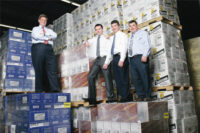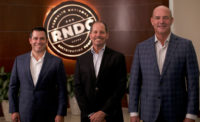With a company history dating back to 1888, Louis Glunz Beer Inc. has been in business long enough to see the beer industry transform around it. “Over the last 125 years, Louis Glunz Beer Inc. has adapted to the many changes in the industry from Prohibition and the Great Depression to the current-day surge in American craft and specialty beers and the use of technology in our everyday lives,” says Jerry Glunz, general manager for the Lincolnwood, Ill.-based wholesaler. “Adapting to these many changes in the community, market and industry is one of the things that distinguishes us from other distributors.”
| Jump to: |
Featuring a comprehensive selection of craft, specialty and import beers that represents more than 190 breweries from around the world, the company continues to expand its portfolio with both international and American craft beers, Jerry Glunz explains. “From grain to glass, we are brand builders from breweries around the globe,” he says.
That expansion is exemplified within its sales for the eight Chicagoland counties it serves. When current Owner and President Jack Glunz assumed his leadership role in 1992, sales were at $9 million, but in 2012, sales reached more than $50 million with more than 43 million cans and bottles sold, says Janet Bischoff, chief financial officer with Louis Glunz Beer.“In an economy that is currently in decline for most businesses that are cutting jobs, we have expanded and invested in our future with more staff, equipment and tools to improve our productivity,” she adds.
During the last five years, the company has added 10 sales representatives, two merchandisers, five managers, four drivers, and approximately 50,000 square feet of warehouse space, Bischoff explains.
“With this expansion, we are meeting the demand for better beers and providing a quality of service to areas within our territory that was not being met,” she adds. “Future plans will increase this growth further as we look ahead to respond to trends in the industry and market.”
Given its burgeoning business and dedication to supporting beer market trends as well as its deeper company philosophies, Louis Glunz Beer has procured Beverage Industry’s 2013 Wholesaler of the Year title.
Voluminous portfolio
Given its expansive offerings, Louis Glunz Beer’s portfolio is composed of 30 percent domestic, 35 percent American craft, and 35 percent imports. Broken down even further, the company’s portfolio consists of 190 breweries, six cideries, five distilleries, four meaderies, three carbonated soft drinks (CSD) brands, two bottled water brands, and one mixer brand.
Beginning with one brewery, Schlitz, in 1888, the company has expanded quite a bit, but a company-shared quote from Jack Glunz exemplifies how the distributer views itself today: “You never forget the lady that brought you to the dance. Schlitz is the beer that gave us our start, and we will continue to support this brand in every way. There has been an exploding trend in the market for retro beer — including Schlitz and Pabst Blue Ribbon — with many young consumers ‘going for the gusto.’”
The company also continues to add new breweries to its lineup on a regular basis, including Portland, Ore.-based Gigantic Brewing Co.; Ten-Ninety Brewing Co., Zion, Ill.; Gratiot, Wis.-based Pecatonica Beer Co.; and the new Frankenmuth Brewery, which will launch with the company in September, from Michigan.
“The demand from the Chicago consumer as part of the third-largest beer market in the country has been fantastic for the American craft beer segment and supporting the small guy,” the company says. “Each brewery has their own unique story of how they have gotten their start in the industry, and the local beer enthusiast wants to hear them.”
The wholesaler’s new partners also have expressed their excitement to join the Louis Glunz Beer portfolio. “Pecatonica Beer Co. is excited to be partnered with Louis Glunz Beer,” said Tim Quinn, head brewer and managing partner for Pecatonica, in a statement. “We actively sought Glunz as a partner for its exceptional craft beer expertise, great reputation across the Chicagoland area, and alignment in key business areas. Glunz has the right resources and exceptional sales people to best represent our brand as a regional artisan beer company focused on brewing small, hand-crafted batches.”
“The demand from the Chicago consumer as part of the third-largest beer market in the country has been fantastic for the American craft beer segment and supporting the small guy." |
The first beer for Pecatonica to reach the Chicago market was Nightfall Lager, which is brewed with a blend of cascade, centennial and hallertau hops; traditional malts; and local Wisconsin water, the company says.
In February, Louis Glunz Beer also added to its import portfolio with the U.S. launch of Stiegl Grapefruit Radler, which is brewed from Stiegl Goldbrau, from Austria brewer Stiegl Brewery.
“Stiegl Goldbrau is blended with soda [and] with real grapefruit juice, giving it a distinct tart aroma and natural cloudiness,” Jerry Glunz says. “Low in calories and alcohol content, Stiegl is an ideal thirst quencher. The initial order of 10 containers has now surpassed 45 containers in the last six months. This brand has caught the attention of media and customers alike.”
When deciding whether to add another beverage manufacturer to its lineup, Louis Glunz Beer asks itself four important questions: Do they have quality products; do they have a solid business plan; can they supply liquid to the third largest beer market in the United States plus accommodate potential growth; and do they have the support in the market?
In order to support the new products and partners it adds, the company has developed product catalogs to educate its 3,400 retailers on the brands.
“We have created these catalogs for our customers to break down the different categories of our partners from around the world,” says Jennifer Faulk, director of marketing for Louis Glunz Beer. “Each listing tells the unique story of the brewery and explains the different brands they represent.”
The catalogs are broken into three books: Domestic Brands, which includes domestic beer, cider, CSDs, distillates and water; American Craft Brands; and Import Brands.
Although having such a diverse portfolio allows the company to tap into the latest trends, it comes with its own set of challenges.
“A challenge for us is that our competition wants our brands without the dedication and commitment that went into building the brand from inception into the Chicagoland market,” Jerry Glunz says. “While we know that some breweries feel that the ‘grass is always greener on the other side of the fence,’ we want them to know [that] they are always welcome to return when they realize that this may not be the case.”
He adds that Louis Glunz Beer’s focus and strength will always continue to be in the beer business, but as its partners venture into new categories, it will operate with careful consideration before adding these products to its portfolio.
Vital support
In order to support some of the latest trends taking place in the U.S. beer market, Louis Glunz Beer doesn’t merely distribute products that support these trends; it also has taken an educational approach.
“We have found that educating the customer and the customer’s customer is key to the growth of the emerging import and craft beer segment,” Faulk says.
Through a partnership with Siebel Institute and Randy Mosher Design, both of Chicago, Louis Glunz Beer’s staff created a teaching booklet titled “Passport to the World of Beers,” which outlines the basics of beer, she adds. The booklet covers the history of beer, ingredients, a tasting how-to, brewing processes, glassware, beer styles, a family tree of beer, and beer and food pairings. The booklet has been used in staff training sessions, beer classes and dinners, Faulk explains.
Jerry Glunz notes that education is a commitment on every level of its business model, including for the staff, retailers and end-consumers.
Louis Glunz Beer also annually hosts its Global Beer Expo. In its 19th year, the invitation-only event allows brewery representatives to meet with retailers from the Chicagoland area to sample more than 200 beers, including some new releases, the company says.
But all of these customer-support models wouldn’t be possible without the company’s greatest asset — its 85 employees.
“We value each and every person’s contributions to the vast day-to-day operations as a beer distributor,” Jerry Glunz says. “From the courteous office staff who answer the phone (no voicemail here), to the driver who wheels the beer up a flight of stairs for our accounts, each person brings a passion to their job that provides customer service that truly sets us apart from other distributors in the market. We have the greatest job in the world. We sell beer for a living.”
Louis Glunz Beer exemplifies that appreciation through its profit-sharing program, which Jack Glunz initiated in 1992 at his inception as president. “Twenty-five percent of profits before taxes go back to the employees,” Bischoff says. “And most important, this profit sharing is based on years of service. In the last three years, over $1.2 million has been distributed to our employees. This vested interest in the end result of profits has given the employees the reason to ensure the beer is delivered, orders are placed, calls [are] returned, and [the] bottom line is watched by the entire company — and they do.”
The company even developed Best Job, a six-part video series featuring staff members highlighting some of the key aspects of their jobs.
In the inaugural video, “Beerfume,” an employee dramatically runs along a beach and peers off into the distance while a narrator expounds on the company’s shared affinity for craft beer.
“I never thought I’d see one of our sales reps rolling around on the beach in frigid temperatures to be a part of this video,” Faulk said in a statement. “But this was an incredible way to bring our staff together. We all believe we have the best jobs in the world, and these videos have been a way for us to celebrate our work while also poking fun at some of our everyday frustrations.”
Created by Chicago-based Joone Studios, additional videos in the online series include “Beer Factory,” “Beertologist,” “Craft Beer Superhero,” “PBR: Now you’re a Hipster,” and “Clown Car.”
This creativity also can be found in the company’s business strategies. “We encourage our staff to think outside the box,” Jerry Glunz says. “The road may be one less traveled, but we are willing to take risks to show we are not afraid of change. We like to forecast the future trends in the market and be ahead of our competition.”
Marketable selling
In order to serve its approximately 3,400 accounts, Louis Glunz Beer’s sales team is organized by geographical area to assist in its in-person approach.
“Our sales force takes pride in face-to-face sales calls with our retail customers,” Faulk says. “This personal relationship helps to foster our ‘partnership in profit’ approach evaluating current inventory levels as well as introduction of new products and packages in the market that can increase sales.”
The company recently invested in tablets for its entire sales staff, she adds. “With the touch of the screen, they can create presentations, send emails, place orders, take photos of their displays, and even check inventory,” Faulk explains. “With VIP’s Digger, the sales force has their route, brewery and account [information] at their fingertips to analyze, plan and strategize their sales calls.”
Just as crucial as having streamlined operations for its sales staff, the company also must have the marketing programs to support the brands.
“The marketing strategy is developed with each brewery team to include many different facets from the launch of the brand within the Chicagoland market to the implementation of promotional programs with the retailers and sales force throughout the year,” Faulk says. “It is important that the unique branding that our brewery partners have developed as a part of their image is complemented with local programs and our support materials.”
She adds that this includes staff and customer brewery tours, public relations, social media, point-of-sales materials, and promotional programs that support national or local campaigns.
Like many companies, social media continues to be a growing presence in marketing plans. Through its Facebook and Twitter handles, Louis Glunz Beer keeps its followers up-to-date on developing news including brewery expansions, new product releases, industry news, contests and promotions, Faulk says.
Active outreach
Although Louis Glunz Beer works hard to develop and maintain strong relationships with its partners and customers, the company also is active within the wholesaler community.
A recipient of the National Beer Wholesalers Association’s 2013 Public Affairs Award, Louis Glunz Beer was recognized for its efforts and the impact of its marketing and public relations efforts to increase awareness of the beer industry in the media, Faulk explains.
Jack Glunz also was honored by the Beverage Retailers Alliance of Illinois at its Annual Unity Dinner in March. He and other honorees were recognized for personifying outstanding achievement, dedication to excellence, and social consciousness.
But Louis Glunz Beer’s outreach isn’t limited to the wholesaler and retailer industries; the company also plays an active role in the communities that it serves.
Some examples of involvement include a holiday winter clothing drive to benefit a local school as well as being the major sponsor of the 2012 Cystic Fibrosis Foundation’s Grand Chef Gala, which raised more $525,000, Faulk says.
Through beer donations and silent auction baskets, Louis Glunz Beer has supported a number of charities in 2012 and 2013, including the Lupus Foundation 5K Run and Walk, Bear Necessities Pediatric Cancer Foundation, Schwaben Verein Chicago – Oktoberfest, and many more.
The company also received a special request from a Skokie,
Ill.-based theater. “We had a unique request from our friends at Northlight Theatre as their production of ‘Stella & Lou’ was set at a bar, so they wondered if we could help with props,” Faulk explains. “Not only did we assist with the standard bar items like signs, glassware and coasters, but [we] even provided a draft system, which we are pretty sure was enjoyed by the entire crew throughout the production.”
Family values
As Louis Glunz Beer embarks beyond its 125 years of wholesale service, the fifth-generation family business does not forget where it came from.
“The family’s enterprise, expertise and steadfast commitment to customer service are the guiding forces for us,” Jerry Glunz says. “The same qualities that Louis I held dear will undoubtedly continue to guide his [descendants] to meet the challenge of the next 125 years. As we conduct business with the third, fourth and now the fifth generation today working at Louis Glunz Beer Inc., we proudly recognize the generations before us who built this family business and made it what it is today. The pride in our family heritage and humble beginnings will never be forgotten. We are proud to provide choices of quality beers to Chicagoland.”
Lincolnwood, Ill.-based Louis Glunz Beer Inc. has had its fair share of streamlined processes in its 125-year history. Servicing eight counties throughout the Chicagoland area with a population of more than 8 million, the company works to ensure operations run like a well-oiled machine.
“The hand baskets and horse-drawn carts of yesteryear have been replaced by a fully computerized, 100 percent pre-sell system on iPads, with 25 trucks delivering product to over 3,400 restaurants, bars, and liquor and grocery stores throughout Chicagoland,” says Jerry Glunz, general manager of Louis Glunz Beer.
With two warehouses in operation, the company supports an expansive portfolio composed of 190 breweries, six cideries, five distilleries, four meaderies, three carbonated soft drinks (CSD) brands, two bottled water brands and one mixer brand. However, as the company sees segments like imports and American craft beer gaining traction, warehouse expansion will be in its future.
“[The] recent purchase of the new warehouse will be for expansion of our offices and cooler space to add an additional 20,000 square feet,” Jerry Glunz says. “Within this new space, we will be adding a cooler to meet the needs of our growing draft business.”
Operating its current facilities on three shifts, the company has two semi-loading docks and three delivery truck docks to service its 25 trucks, four pup-trailers for special events, and one over-the-road semi-trailer, he adds.
Louis Glunz Beer utilizes a combination of side-load trailers and end-load trailers based on the delivery route and customer needs to service its 17-20 daily routes, Jerry Glunz explains.
The company also is considering the use of hybrid technology for its fleets in the future, he adds.



 Read other Wholesaler of the Year articles
Read other Wholesaler of the Year articles




